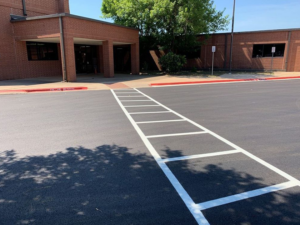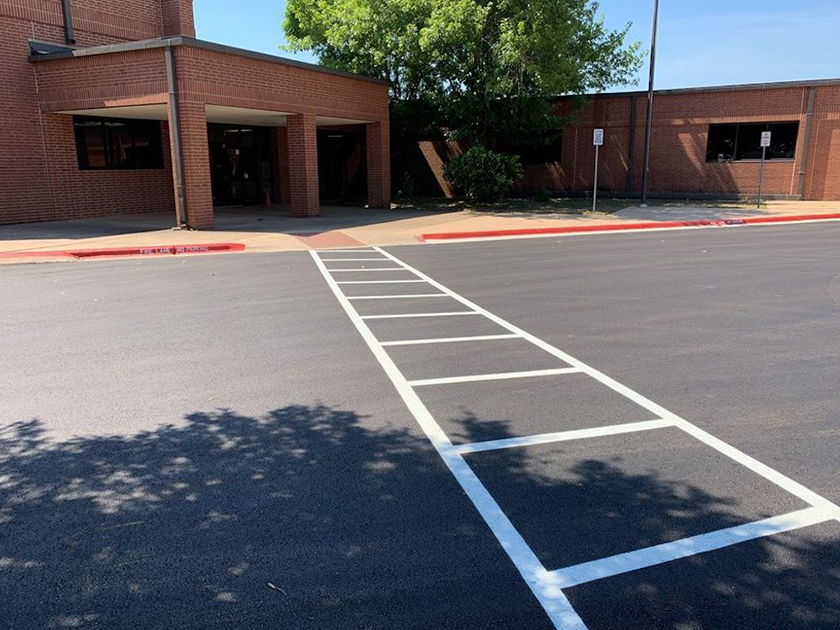 Paving companies know that regular applications of sealcoating can add many years to the useful life of any asphalt pavement. Sealcoating blocks damaging UV rays, helps prevent water infiltration and slows the penetration of oil and other petrochemicals that destroy the binder in asphalt pavements. However, unless the contractor mixes and applies the sealant correctly, the sealcoating will likely have a very short and unattractive life. This is a waste of your money, but what is worse is that it can leave your pavement without the protection it needs. Often, a sealcoating job fails because an unscrupulous or inexperienced contractor takes one or more shortcuts.
Paving companies know that regular applications of sealcoating can add many years to the useful life of any asphalt pavement. Sealcoating blocks damaging UV rays, helps prevent water infiltration and slows the penetration of oil and other petrochemicals that destroy the binder in asphalt pavements. However, unless the contractor mixes and applies the sealant correctly, the sealcoating will likely have a very short and unattractive life. This is a waste of your money, but what is worse is that it can leave your pavement without the protection it needs. Often, a sealcoating job fails because an unscrupulous or inexperienced contractor takes one or more shortcuts.
Sealcoating Shortcuts a Paving Company Should Never Take
What Are Some Common Shortcuts That Asphalt Sealing Contractors Should Avoid?
There are several ways that a sealcoating contractor can botch a job. These include preparing the mix with too much water or too little sand, applying the sealant when weather conditions are unsuitable, failing to prepare the pavement properly, applying the sealant too thickly, and rushing to reopen the area.
How Does an Improper Mix Affect a Sealcoating Job?
Every sealant manufacturer provides guidelines for mixing their products. They specify how much water, sand, and sealant the contractor should combine to produce a liquid sealant. If the mix contains too much water, the sealant will too thin and runny to provide adequate protection. If the mix does not contain enough sand, the sealcoating will not be as durable or provide as much traction. Some contractors deliberately skimp on the sand so that they can increase the amount of water in the mix. This diluted mix can cover more area, but the product will provide little protection.
How Can the Weather Ruin a Sealcoating Job?
Asphalt sealcoating products can be quite finicky. The temperature must be at least 50 degrees during the application and for the first 24 hours. It is also desirable for the humidity to be less than 50%. If the weather is too cool and humid, the sealant will cure more slowly, and it is possible that only the top layer will cure at all. Since the sealant below the surface is still liquid, it can continue to flow, resulting in sealcoating that cracks, flakes, or washes away. A mild breeze is helpful, but a strong wind can cause an uneven application pattern. Furthermore, sealants need several hours of exposure to direct sunlight, and it is imperative that no rain falls for at least 24 hours after the application. Avoid paving companies that tell you that they can seal your pavement in any weather.
What Is the Importance of Pavement Preparation for Asphalt Sealcoating?
Sealants must establish a strong bond with the pavement. If the pavement is dirty, the sealant will not bond properly. Oil stains can also interfere with the bond, so the contractor must clean them or prime them. Furthermore, it is essential to perform any necessary parking lot repair prior to sealcoating. This includes asphalt crack sealing, pothole repair, or patching. If there are breaks in the pavement’s surface, the sealcoating will simply flow into the voids without repairing them. Many people and even some novice contractors do not realize that asphalt sealing and crack sealing are two very different procedures.
What Impact Does Applying a Thick Layer of Sealant Have on the Success of a Sealcoating Job?
Applying a thick layer of sealant will take less of the contractor’s time than using two thin layers. However, no reputable contractor would choose this route. Sealcoating cures from the top down, so the bottom layers will stay in flux long after the surface seems dry. The underneath layers’ motion will cause the top layers to crack, wrinkle, or flake, reducing the life of the sealant. Furthermore, since the bottom layers may never cure, you could have issues with tracking.
Why Should a Contractor Avoid Rushing to Reopen an Area After Sealcoating?
Sometimes, a customer insists that a contractor reopen an area in less time than the contractor recommends. At other times, the contractor is in a hurry to finish the job and call it a day. This is especially true if the job includes multiple coats of sealant or pavement striping. Reopening a pavement before the curing process is complete can destroy the sealcoating job, and it can also lead to tracking.
Alpha Paving Is Your Dependable Source for Repairing, Maintaining, and Paving Austin Parking Lots and Streets
Alpha Paving is an Austin paving contractor based in Round Rock, Texas. We earned our outstanding reputation by consistently providing superior customer service and exemplary workmanship to clients in virtually every industry, including the hospitality, industrial, retail, dining, educational, and health care industries. Our services include asphalt sealcoating, asphalt repairs, parking lot maintenance, thermoplastic markings, asphalt paving, asphalt resurfacing, concrete repair and installation, parking lot striping, asphalt milling, and road construction. We offer free quotes, so call our headquarters in Round Rock at 512-677-9001 or fill out the online request form.




